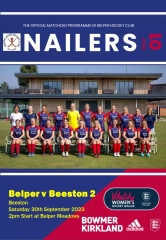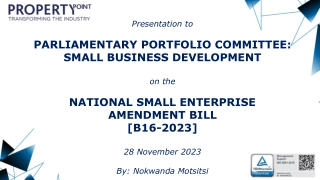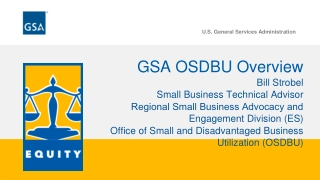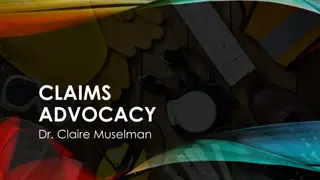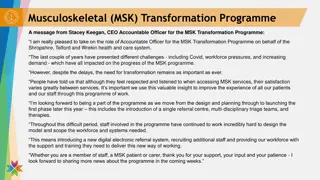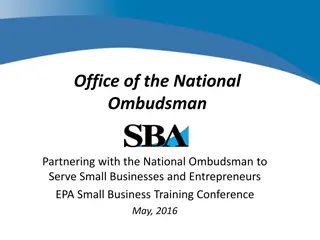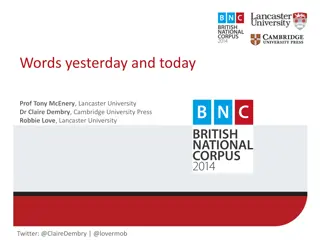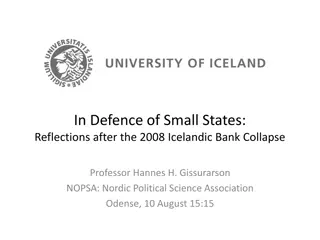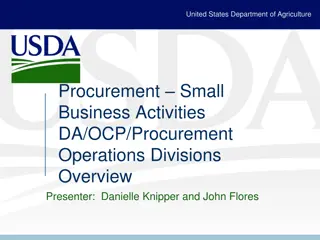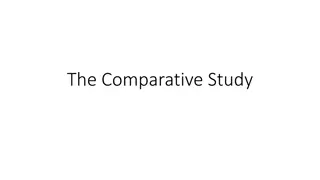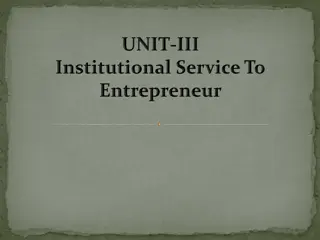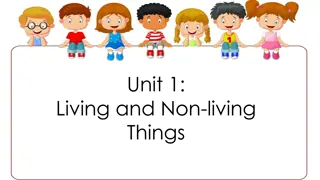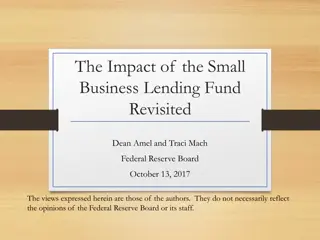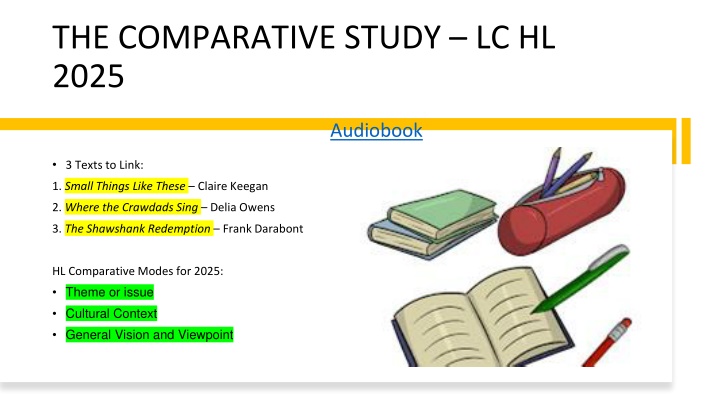
Exploring Themes of Family, Conscience, and Institutional Abuse in 'Small Things Like These'
Dive into the setting and characters of "Small Things Like These" by Claire Keegan, as they navigate themes of family, poverty, conscience, and the influence of the Catholic Church in 1980s Ireland. The book sheds light on the dark history of the Magdalen laundries and the culture of abuse and silence that pervaded society. Join the protagonist, Bill Furlong, as he grapples with doing the right thing despite the challenges he faces.
Download Presentation

Please find below an Image/Link to download the presentation.
The content on the website is provided AS IS for your information and personal use only. It may not be sold, licensed, or shared on other websites without obtaining consent from the author. If you encounter any issues during the download, it is possible that the publisher has removed the file from their server.
You are allowed to download the files provided on this website for personal or commercial use, subject to the condition that they are used lawfully. All files are the property of their respective owners.
The content on the website is provided AS IS for your information and personal use only. It may not be sold, licensed, or shared on other websites without obtaining consent from the author.
E N D
Presentation Transcript
THE COMPARATIVE STUDY LC HL 2025 Audiobook 3 Texts to Link: 1. Small Things Like These Claire Keegan 2. Where the Crawdads Sing Delia Owens 3. The Shawshank Redemption Frank Darabont HL Comparative Modes for 2025: Theme or issue Cultural Context General Vision and Viewpoint
SMALL THINGS LIKE THESE CLAIRE KEEGAN THE NOVEL'S SETTING & CHARACTER LIST SETTING = New Ross, Co. Wexford. (1985) CHARACTERS: Bill Furlong protagonist -works as a coal & timber merchant and runs a successful business. Married with 5 daughters. Sees institutional abuse and cruelty to girls at a local convent and makes the brave decision to oppose the nuns, even though this may have a detrimental effect on his business and his family's prospects in the small town. Eileen Furlong Bill s Wife. Unlike Furlong who chooses to make a stand against the cruelty of the nuns, Eileen encourages her husband to stop meddling in others business and turn a blind eye to proceedings at the convent. Mother Superior Runs the Good Shepherd Nuns' convent with an iron fist. Pretends to be horrified when the girl in the coal shed appears with Furlong in the convent. Mrs Wilson a wealthy and kind Protestant lady who employed Furlong's mother as a domestic servant and kept her in employment after she became pregnant at 16. Ned - a farm hand who worked for Mrs Wilson. Looked after Furlong after his mother died in an accident when he was just 12. Sarah - the girl from the convent that Furlong discovered in the coal shed. Mrs Kehoe the proprietor of a local pub who tells Furlong that it might be a bad idea to oppose the nuns by exposing wrongdoing and abuse in the convent.
Small Things Like These Some Themes & Issues Family Poverty Doing the right thing following what your conscience tells you The influence of the Catholic Church in Ireland of the 1980s Institutional Abuse
A Note on the Text The Magdalen Laundries This is a work of fiction. Ireland's last Magdalen laundry was closed down in 1996. It is estimated that 30,000 Irish women and girls were incarcerated in these "homes". Many women that were sent to these institutions had become pregnant outside of marriage. They gave birth to their babies in these homes and the babies were then taken away from them. The Mother and Baby Home Commission Report of 2021 found that 9,000 babies died in 18 homes investigated. The most shocking discovery was that 796 babies died in the Tuam home between 1925- 1961. These institutions were run and financed by the Catholic Church. The Irish State approved the actions that went on in these homes and did not conduct any investigation into abuse until the 1990s. It took until 2013 for the then Taoiseach, Enda Kenny, to offer a public apology for the systematic abuse and neglect that went on in these homes. The Magdalen laundries and care homes is now correctly seen as a shameful symbol of Ireland's past. The novel, Small Things Like These, is a critique of the Catholic Church's Magdalen laundries and the culture of abuse and silence that existed there in 1980s Ireland.
MAGDALEN LAUNDRIES IRELANDS SHAMEFUL PAST From the foundation of the Irish Free State in 1922 until 1996, at least 10,000 (see below) girls and women were imprisoned, forced to carry out unpaid labour and subjected to severe psychological and physical maltreatment in Ireland s Magdalene Institutions. The women and girls who suffered in the Magdalene Laundries included those who were perceived to be promiscuous , unmarried mothers, the daughters of unmarried mothers, those who were considered a burden on their families or the State, those who had been sexually abused, or had grown up in the care of the Church and State. Confined for decades on end and isolated from their families and society at large many of these women became institutionalised over time and therefore became utterly dependent on the relevant convents and unfit to re-enter society unaided. Claire Keegan dedicates her novel to the women and children who suffered time in Ireland s mother and baby homes and Magdalen laundries . Ms Keegan also prefaces her novel with a quotation from the 1916 Proclamation of Independence which speaks about cherishing all of the children of the nation equally .
Chapter 1 Pages 1-3 Establishes a grim setting. It is New Ross, Co. Wexford in 1985. It is a raw-cold winter s day. The townspeople are battling the harsh elements as they stand in dole queues or went about other business such as shopping in the supermarket or meeting in pubs and the chipper . The harsh weather is good for Bill Furlong s business. He sold coal and timber from a yard near the docks to the townspeople of New Ross and surrounding areas. Furlong owns the business. He is an extremely hard and conscientious worker, as he is conscious that he helps to keep people warm and businesses going by delivering coal to them.
Chapter 2 Pages 5-14 Furlong was born on April 1st, 1946. His mother was 16 and unmarried, and her family turned their back on her for getting pregnant. But Mrs Wilson, her Protestant employer, showed kindness by keeping Furlong s mother on as a domestic servant and treating her with respect always. Mrs Wilson took care of Furlong as he grew up she encouraged him to read a lot and to be thorough and hardworking. This gave Furlong a strong work ethic. After a few years in the Technical 2ndLevel school in New Ross, Furlong went to work in the coal yard. By having a head for business and a solid work ethic, Furlong came to take over the coal yard and create a successful business for himself and his family. Furlong s mother died suddenly when he was only 12. When he went into the registry office to get a copy of his birth certificate years later, his father s identity was described as unknown on the certificate. A cruel and judgemental official in the registry office handed him the cert with an ugly smile on her face obviously passing silence judgement on his past. Now in the present of the novel, Furlong is married to Eileen. They have five daughters: Kathleen, Joan, Sheila, Grace and Loretta. Furlong is grateful to have five healthy girls and comments to his wife, aren t we the lucky ones? (10) to have daughters who are healthy and loved by both parents. The title, Small Things Like These (11) refers to Furlong discussing the family and issues in the town. He is a deep- thinking individual, who is appreciative of all the good things he has in life. Of course, his upbringing as a child who was ridiculed at school for his status as an illegitimate child has had a huge bearing on his life.
Chapter 2 - continued The poverty of Ireland in the mid 1980s in made clear. Furlong observes that the dole queues were getting longer and people who were unable to pay ESB were forced to sleep in their overcoats . (12) Worse still, Furlong had seen a schoolboy drinking the milk out of the priest s bowl behind the priest s house . (13) It was a time of mass emigration from Ireland, as well as the signing of the Anglo-Irish Agreement in Northern Ireland and stories of moving statues of the Virgin Mary in Ballinspittle, Co. Cork. Furlong knew that his family lived in relative prosperity in relation to the majority of people around New Ross. He wanted to work hard to ensure his daughters complete their education at St. Margaret s, which was the only good school for girls in the town (14).
Questions Chapter 2 How does Furlong's early life, including his connection with Mrs. Wilson and his upbringing in the big house, shape his character and attitude toward life? What role does Mrs. Wilson play in Furlong's life, and how does her influence contribute to his upbringing and eventual success? How does Furlong's relationship with Eileen evolve throughout the chapter, especially in terms of their mutual support and concerns for the well-being of their daughters?
Chapter 3 Pages 15-35 As the Furlong family prepare for Christmas by putting up the decorations, making the Christmas cake and writing to Santa, Furlong s mind drifts back to his childhood. He used to ask Santa for his daddy or else a jigsaw puzzle (20) and when neither request arrived at Christmas, he was disappointed. Furlong knew that the name he was called at school was because he didn t have a father like the other boys there. Mrs Wilson had a positive influence on Furlong s childhood. She encouraged him to read and taught him the importance of learning. Everyone should have a vocabulary , she told him. Her influence rubbed off positively on the young boy. He won first prize for spelling in a competition at school and Mrs Wilson had praised him by saying that he was a credit to himself for achieving this prize. Furlong was bursting with pride at this success and for a brief moment as a child, he felt that he mattered as much as any other child . (27) So, it is clear to see that Furlong felt inadequate and lacking in self-confidence as a child. This was due to the lack of a father-figure in his life. Furlong and his wife have differing personalities. He is deep-thinking and reflects on the past frequently whereas she just seems to look forward and not reflect on what has gone. He envies this aspect of her personality and comments that, I sometimes wish I had your mind (31) as she seems untroubled in comparison to him. In fact, Furlong sees that there is somewhat of an emotional gap between himself and his wife. He often felt that he was poor company (34) for his wife and wonders if she ever thought would her life better if she married another man. This level of deep-thinking and introspection is typical of Furlong s personality. He is hard-working and stoic also, but in spite of all he has accomplished in his life, he is somewhat discontent.
Questions Chapter 3 How does the relationship between Furlong and Eileen change in this chapter? How does the family's financial situation impact Furlong and Eileen's relationship?
Chapter 4 Pages 37- 47 The first mention of the Good Shepherd Nuns who ran a training school for girls and provided them with a basic education occurs in this chapter. There is also a laundry business (38) in the convent. The laundry had a good reputation. The local priest, hotels and guest houses reported that the linen sent into the laundry came back same as new . Rumour in New Ross that the girls housed there were of low character and had to do penance for their sins by washing the stains out of the laundry. There was an air of secrecy surrounding the convent and what happened there. Some people felt that girls were mistreated and abused by the nuns, while others thought the nuns had hearts of gold and spent all their time and effort in rehabilitating the girls under their supervision. A key moment occurred when Furlong went to the convent to deliver a load of coal to the nuns. He went down the side of the building and saw at least 12 young women on their hands and knees furiously polishing the floor of the chapel. None of the girls were wearing shoes, one had a noticeable sty in her eye, while a 3rd looked as if her hair had been cut with a shears. Furlong s shock intensified when a girl in a Dublin accent pleaded with him to take her out of there as all she ever thought of was killing herself. (41) This was the first time that Furlong s suspicions that there was institutional abuse occurring in the local convent. Furlong also noticed the padlocks on the doors and the glass cemented into the top of the high wall to prevent escapees from the convent. Such disturbing images have a deep effect on Furlong s psyche. It makes him question whether he can continue to turn a blind eye to abuse at the convent or make some kind of stance to protect the girls imprisoned there.
Chapter 4 - Continued That evening, Furlong and his wife have an argument when Bill explains what he saw in the convent that day. Effectively, Eileen tells Bill to mind his own business and keep out of the nuns affairs. She says that their girls are fine when he mentions what if one of their daughters were in the convent. Furthermore, she seems to approve of the regime that the nuns impose. She thinks the girls are lucky to finally have someone to look after them and warns her husband that if you want to get on in life, there s things you have to ignore, so you can keep on . (45) Eileen is willing to turn a blind eye to abuse, whereas Bill has a troubled conscience which will not allow him to just settle and mind his own business. Furlong comments that his mother was lucky that Mrs Wilson was kind and didn t turn her out of employment because she had a child at 16. Her compassion is dismissed as little more than do-gooding and time-filling by Eileen. Her dismissive attitude and lack of compassion angers Furlong the seed of further conflict between them has been sown.
Questions Chapter 4 What rumours and opinions circulate about the Good Shepherd nuns, their training school, and laundry business? What does Furlong notice during his visit to the convent, and how does it change his view of the place? How does Eileen respond to Furlong's account of the convent, and what does her perspective reveal about her values? Reflect on Eileen's philosophy of ignoring certain things to "get on in life." What does this say about her character? How does Furlong differ in his attitude to this subject?
Chapter 5 Pages 49-72 One of the novel's key moments occurs when Furlong revisits the convent on the day before Christmas Eve in 1985. He was going there to deliver coal for Christmas. To his horror, he saw that a girl was in the coal shed when he opened the door to load the delivery. It was obvious that she had been there for a long period of time. She was extremely frightened and was barely able to stand up. Excrement was strewn all over the floor. It is a sight that Furlong cannot choose to ignore he must try to help this girl. The girl tells Furlong to ask the nuns about her baby. The baby was taken from her when he was 14-weeks-old. When Furlong meets the Mother Superior of the convent, the head nun feigns care and pretends to care about the child's welfare by saying, "God love you, child. Come in and get yourself upstairs into a hot bath..." (62) The Mother Superior invites Furlong in for tea and cake and give him a Christmas bonus. In an awkward conversation over tea, she enquires about Furlong's daughters and hints that it may be difficult for them to find a place "next door" at the school they run if Furlong delves too deeply into what he saw that day. Mother Superior then says that he must be "disappointed" not to have had a boy to "carry on the family name". But Furlong counters with how he proudly took his mother's name and that it "never any harm did it do me". (67) When the girl returns after the bath, she is dressed in clean clothes. She is invited to have tea and cake, but is clearly intimidated by the nun's presence. When she is asked by Mother Superior why she ended up in the coal shed, the girl pretends that it was a game of Hide and Seek that went wrong. She is made admit to Furlong that, "it was a big nothing, Mother". (69)
Chapter 5 Contd. When the girl returns after the bath, she is dressed in clean clothes. She is invited to have tea and cake but is clearly intimidated by the nun's presence. When she is asked by Mother Superior why she ended up in the coal shed, the girl pretends that it was a game of Hide and Seek that went wrong. She is made admit to Furlong that, "it was a big nothing, Mother". (69) Before Furlong leaves, he speaks to the girl. He asks her name. She says that she is "Sarah Furlong" but is referred to as "Enda" in the convent. He tells her his name and says that she is contact him if she ever needs help.
Questions Chapter 5 Describe the events that led to Furlong discovering Sarah in the coal shed. How does the Mother Superior react to the situation with Sarah? Discuss the role of the Mother Superior in the story and her relationship with Furlong as seen in Chapter 5.
Chapter 6 Pages 73 - 87 Furlong is deeply affected by what he just witnessed at the convent. He was short-tempered with Eileen, went to Sunday Mass with the family but was distracted and disengaged. He didn t receive communion as he normally did. Afterwards, he put up the Christmas tree, but instead of being excited by the thought of Christmas, Furlong "felt as though the room was closing in" on him (79) and made an excuse to leave and visit Ned, who worked as a farm hand for Mrs Wilson. He worked alongside Furlong's mother; Sarah and he knew Furlong since he was a child. On his way there, Furlong remembers a past visit to see Ned when Mrs Wilson was still alive. Furlong was newly married then. On that occasion, Furlong and Ned chatted amiably, and Furlong asked the old man if he knew who Furlong's father was. Ned replied that he didn't know but that lots of visitors came over from England to visit the Wilsons, and one of them might have slept with his mother. Ned had told Furlong on that occasion that everything "turned out all right in the end" (83), implying that Furlong should not pursue the matter of his paternity further. However, on this occasion, when he tries to visit Ned at the Wilsons' large estate, a woman with an Enniscorthy accent tells him that Ned contracted pneumonia and is currently residing in a convalescent home. The woman comments on Furlong's close resemblance to Ned. This startles Furlong, but he doesn t comment. Furlong politely refuses the woman's offer to go inside. Instead, he sits in his lorry and thinks for over 30 minutes about the woman's comment regarding his resemblance to Ned. He is further troubled by his inaction and broken promise to Sarah the girl in the coal shed. She had asked him to enquire about her baby, but he had not. Instead, he took the Christmas bonus money from them and left Sarah sitting at the nun's table "with nothing before her and the breast milk leaking under the little cardigan and staining her blouse". (87) Furlong feels guilty and tormented at this stage of the novel. His conscience is telling him to make a brave stance and do something proactive to help Sarah. Will he be strong enough to do the right thing?
Chapter 6 - Questions How does Furlong's relationship with Eileen during the holiday season reflect their marriage? How does the unexpected money from the convent impact Furlong's mood? Give evidence to show that Furlong is troubled and unhappy in this chapter. Why is he feeling this way?
Chapter 7 Pages 89-110 Poverty is an issue for many of the New Ross' inhabitants. This is seen as Furlong makes his final coal delivery before Christmas. Some families in financial need ask him to hold off on looking for payment for the fuel, and always, Furlong delivers coal to any customer in need. People are grateful for the essential community service that he provides. He is showered with gifts for Christmas. He is popular and admired in the community as a good person. However, he is acutely aware of the poverty suffered by many in the community and feels guilty for not regifting the boxes and biscuits he received as presents to poor families. After work, Furlong brings his employees into Kehoe's pub for a complimentary Christmas dinner. After the meal, Mrs Kehoe mentions Furlong's recent visit to the convent. She warns him of the danger of coming into conflict with the nuns, who "have a finger in evry pie". (94) Like Eileen earlier, Mrs Kehoe is aware that opposing the nuns could have a detrimental effect on the prospect of Furlong's daughters gaining access to a good education at "St Margaret's", which is adjacent to the convent. Furlong doesn t take offence to her warning as he knows that it is given out of concern for him and his family.
Chapter 7 - Continued Furlong begins to realise that "the things that were closest to him (are) so often the hardest to see" (100) as he remembers how upset Ned had been when his mother was accidentally killed in a fall on the cobblestones on the Wilson's estate. It was Ned who watched steadfastly over Furlong as he grew older, bought him his first razor, taught him to shave and polished his shoes. These acts of kindness now make sense to Furlong, as he feels that Ned may be his father. The novel's resolution occurs when Furlong returns to the convent late on Christmas Eve. It is snowing and he sees a set of footprints in the snow. He goes to the coal house door, slides the bolt open and calls Sarah's name. To his horror, he finds Sarah as a prisoner again. He gently says to her: "You'll come home with me now, Sarah". (105) He decides against bringing the girl to the priest's house, as he believes that the clergy already knew about the abuse going on at the convent. As Mrs Kehoe had reminded him, "They're all the one". (106) As they walk through the town of New Ross towards his home, people glare at Furlong and the strange, dirty and barefooted girl with him. Yet, Furlong feels empowered and at that moment realises, "never once in his whole and unremarkable life had he known a happiness akin to this". (109) He thought of Mrs Wilson, whose kindness in keeping Furlong's mother in employment as a domestic servant kept her from the care home. He is making a brave decision to bring Sarah home to his family. The novel has a cliffhanger ending as he and the girl are about to enter Furlong's home late on Christmas Eve. The reader is left to speculate about the reaction they will receive from Eileen and his five daughters.
Chapter 7 - Questions How is generosity portrayed in the chapter, and what role does it play in shaping relationships? Identify instances of foreshadowing in the chapter. How do they contribute to the story? Examine Mrs. Kehoe's advice to Furlong about keeping the enemy close. How does it connect to the story's themes? Comment on Furlong's sense of responsibility towards Sarah. What do you think about his actions? Comment on how the novel concludes. Are you left with a positive, negative or mixed feeling? Explain your ideas. (General Vision & Viewpoint)

